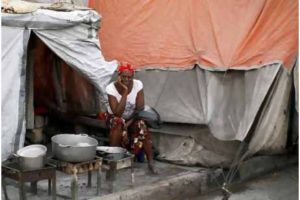By Ron Allen
NBC News Correspondent
Two years after it was rocked by a devastating earthquake, Haiti is struggling just to get back to being one of the most impoverished nations in the world.
When you drive around the capital Port Au Prince, there are signs of progress. Unlike two years ago, the streets are clear of debris, yet jammed with traffic. Every once in a while, you see a new building like a supermarket, or a few small homes, or the refurbished airport terminal, which now looks and functions like most airports in the developing world with several non-stop flights a day to New York and Miami, along with other destinations.
But for every inch of progress, there are many, many miles of devastation and despair. Much of the capital Port Au Prince is so battered that it is difficult to tell whether the destruction was caused by the earthquake or decades of grinding poverty. The national government palace in the heart of the capital lies virtually untouched since it collapsed two years ago. That, as much as anything else, is a potent symbol of what has not happened here.
Throughout the capital and surrounding area, where some 80,000 buildings collapsed, one of the most striking things you see are the tents. Some camps of them sprawl for acres and acres. Some are smaller, tucked into a corner. Many people live in wood or cardboard framed structures with plastic sheeting or perhaps a piece of tin for a roof. It’s hard to see how people survive the tropical storms and the intense rainy season. Some of the camps have taken on an air of “semi-permanence,” run by aid groups, and organized into little self-contained communities. They’re not going anywhere anytime soon.
One of the groups building homes for displaced Haitians is the Red Cross. They built homes for 36,270 Haitians in 2011, bringing the total number of people they’ve provided homes for since the earthquake to 100,000 people.
“Port au Prince is a mountainous city, even finding available safe space to build on is incredibly difficult,” said Jana Sweeny, spokeswoman for the American Red Cross. And disputes over land and the immense amount of rubble make it difficult to find places to build, said Sweeny.
“So many records were lost, that it’s really hard to clarify what land is available to be built on and the last thing we want to do is put up houses to have them taken for some reason,” Sweeny said.
Even before the quake, Haiti was one of the poorest nations in the world. But the quake, which killed some 300,000 people and left more than 1.5 million homeless, drove the nation even deeper into despair.
The statistics say only about half of the rubble has been removed. There was 10 million cubic meters of it, or by one estimate, 10 times the amount of debris left by the September 11th attacks.
The international community pledged more than $4.5 billion dollars to help Haiti’s recovery, but so far, just over half, 52 percent, has been disbursed.
“You’re moving from emergency response to recovery and that has complexities. Things take time…More could be done, we can always do better. At the same time, people are trying hard,” said Jehane Sadky, officer in charge at the UN Office of the Special Envoy for Haiti.
Sadky’s office is in charge of tracking where all the money has gone. She said that most of the money that has been disbursed has gone to NGOs or grants, not directly to the Haitian government.
“We want to emphasize that perhaps more money should go through Haitian institutions,” Sadky said. “Haiti deserves to get up on its feet alone and won’t be able to do that unless it has the money to do so.”
In part, donors have been reluctant to give the money they’ve committed directly to the Haitian government because of this year’s election. The painfully prolonged and disputed election finally produced a president and then five months later a prime minister and a government.
Once assembled, the newly elected government did not renew the mandate for the Interim Haiti Recovery Commission, the group headed by former President Bill Clinton that was helping coordinate relief efforts.
On top of the political changes, there’s been an ongoing cholera epidemic that killed about 7,000 people and sickened perhaps half a million Haitians in the wake of the earthquake.
Haiti is a place where no one expected paradise in a couple of years, but there was certainly a lot of hope that things would be better than they are now, two years later. Like in so many other places around the world, after the initial disaster, an outpouring of sympathy, and promises of help, the world moves on. Meanwhile, Haiti still struggles to claw its way back to being one of the poorest nations in the world.
Rock Center’s Jessica Hopper contributed to this report.
